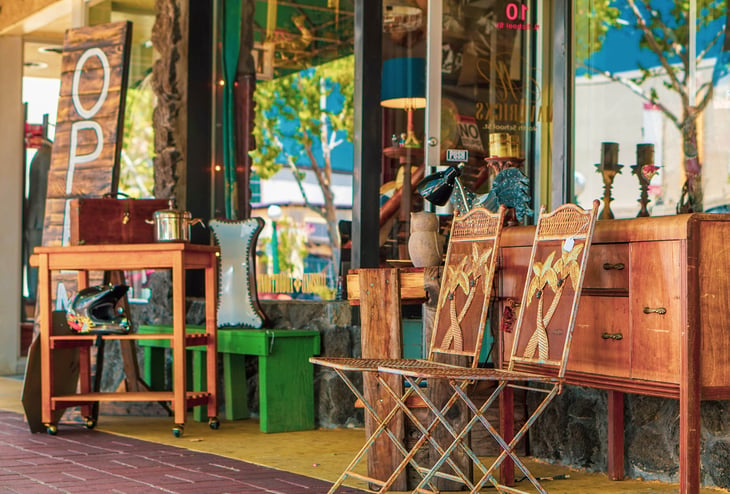
Life’s hard enough when a family member dies. But the stress can be compounded when those left behind are confronted with a houseful of inherited furniture. To make matters worse, the used furniture market is fairly limited. Instead of hulking antiques, today’s young homeowners prefer smaller pieces that are multipurpose and easy to move.
After a couple of decades of appraisal and resale work (plus a few years helping my mom downsize), I have some advice for those overwhelmed with inherited furniture. Here are tips for liquidating it all (and preserving your sanity).
1. Start early

In an ideal situation, you could begin liquidating furniture before you inherit it.
Invite your parents or grandparents to have an open conversation about their plans. Do they hope to eventually downsize? How could their home be rearranged to better suit their current lifestyle? Could large china cabinets, unused bedroom sets or formal dining room furniture go now?
Position the idea as a way to streamline the home for safer aging in place. Less furniture means fewer tripping hazards, less to clean and maintain, and less to worry about.
Remember, letting go of possessions can be a deeply emotional journey. Be sensitive and respect whatever decision your loved one reaches.
For more, see: “8 Essential Home Features for Aging in Place”
2. Know what you have

Knowing what’s hot in the market is key to assessing value and, in turn, understanding what options you have for liquidation.
For example, Victorian or Colonial-style furniture is a notorious tough sell. I’ve seen sideboards and china cabinets hauled to the landfill after an auction or estate sale because no one was willing to pay even $5 for them.
On the other hand, midcentury furniture couldn’t be hotter. Buyers will happily compete over the price for pieces by Heywood-Wakefield, Eames and Herman Miller.
Carefully examine the furniture you’ve inherited. Determine what period it fits into, look for a maker’s mark and research comparable sales on eBay or 1stDibs.
3. Host an estate sale

Sometimes called a “tag sale,” an estate sale is a good way to liquidate furniture without having to move it first. Buyers come into the home, shop pre-priced (or tagged) items, buy what they like and either take it with them or arrange a pick-up time.
Many estate sale hosts hand out numbers and allow only five to 10 people in the home at a time. This not only controls crowds, it allows buyers to consider each item without feeling competition from throngs of other shoppers.
Pro tip: Market large, outdated furniture by suggesting how it could be repurposed. At an estate sale last summer, I noticed the hosts had attached cute little signs to hutches, curio cabinets and console stereos. Each sign offered a different creative idea.
For more pro tips, read: “11 Estate Sale Shopping Tips From an Expert”
4. Auction it

A household auction can be conducted on-site, at an auction house or at a rented location. Though fees vary widely, a 10% to 15% commission on gross sales for the auctioneer is standard.
Auctions are a good choice for families that are constrained by time and need everything to be liquidated completely. Typically, whatever doesn’t sell becomes the responsibility of the auction service.
The potential downside? Most auctions are completed in a single day. Bad weather and other uncontrollable circumstances can reduce turnout and affect overall sales.
5. Sell through a consignment shop

When you consign an item, you agree to sell it through a third-party vendor and split the proceeds. Though fees vary based on store and item, consignment shops usually keep 40% of the sale price for furniture.
Consignment works best for those with unusual or valuable pieces of furniture. It affords the seller time — time to find just the right buyer and, hopefully, maximize value.
Be prepared: To maximize every inch of showroom space, consignment shops have to be choosy. Staff will refuse items they deem too difficult to sell.
See also: “Where to Sell Your Stuff for Top Dollar”
6. Work with a liquidating service

Working with an estate liquidator is similar to coordinating an estate sale, but the liquidator handles everything. Duties typically include:
- Appraising and pricing
- Set-up, advertising and hosting the sale
- Shipping (for items sold online)
- Cleaning up and donating unsold items
- Issuing payment and providing relevant documentation for tax purposes
According to EstateSales.org, established companies may charge a 25%-45% commission rate. But for sellers who live out of the area, having a local professional manage everything can be well worth the price.
7. Be (very) flexible on price

People tend to overvalue furniture that’s been in the family for a generation or two. It’s completely understandable — your parents treasured that enormous sideboard, so why doesn’t the rest of the world?
Remember, styles and tastes change. Instead of clinging to rigid price expectations, listen to the market and be willing to negotiate. If it helps, consider all the moving and long-term storage fees you’ll avoid by selling quickly.
8. Give it away

Share the love! Invite close friends and family to choose pieces of furniture to keep for themselves. This can be especially helpful for the college-bound or young families trying to furnish their first home.
To avoid squabbles, set some ground rules. Be clear about deadlines for pick-up and who’s responsible for loading and hauling.
If friends and family aren’t interested, donate to Goodwill or list pieces on Freecycle.





Add a Comment
Our Policy: We welcome relevant and respectful comments in order to foster healthy and informative discussions. All other comments may be removed. Comments with links are automatically held for moderation.